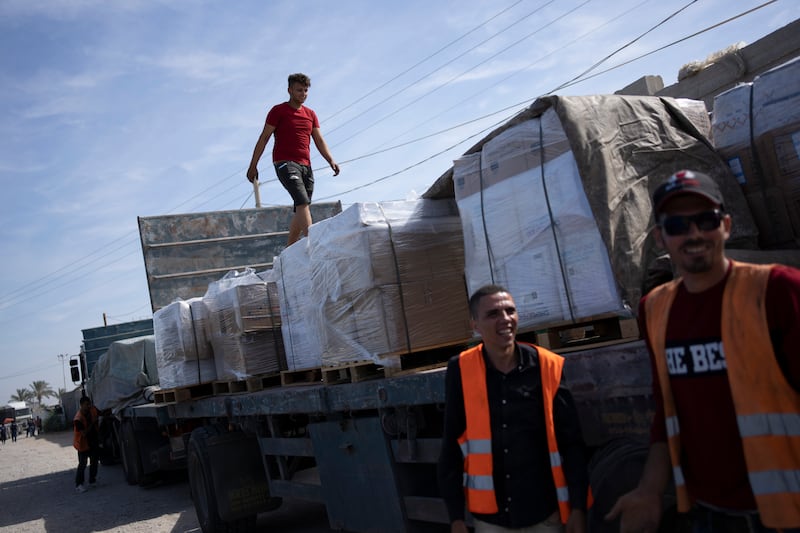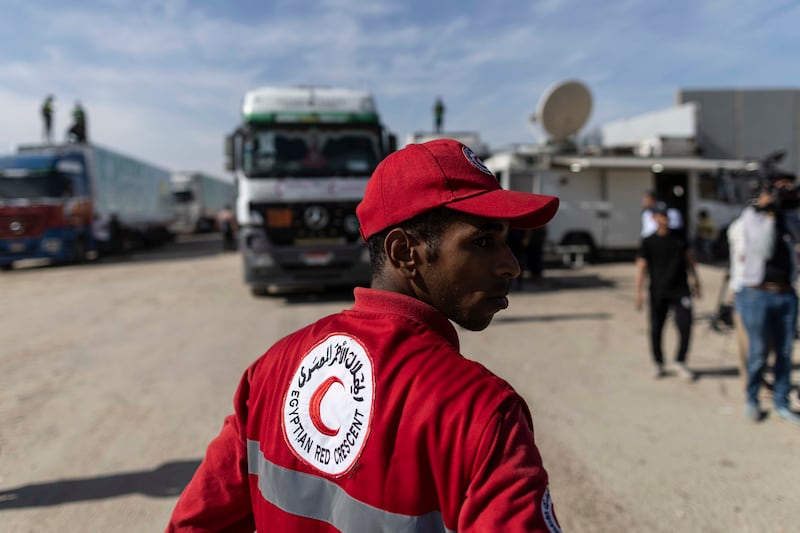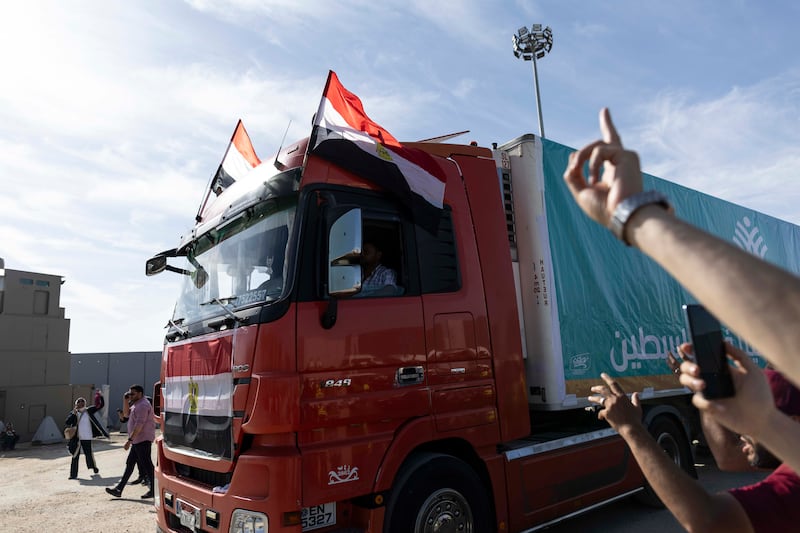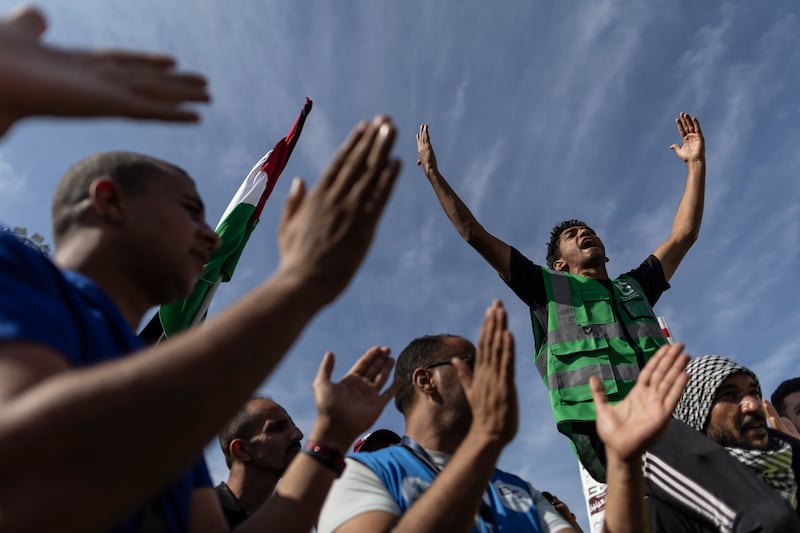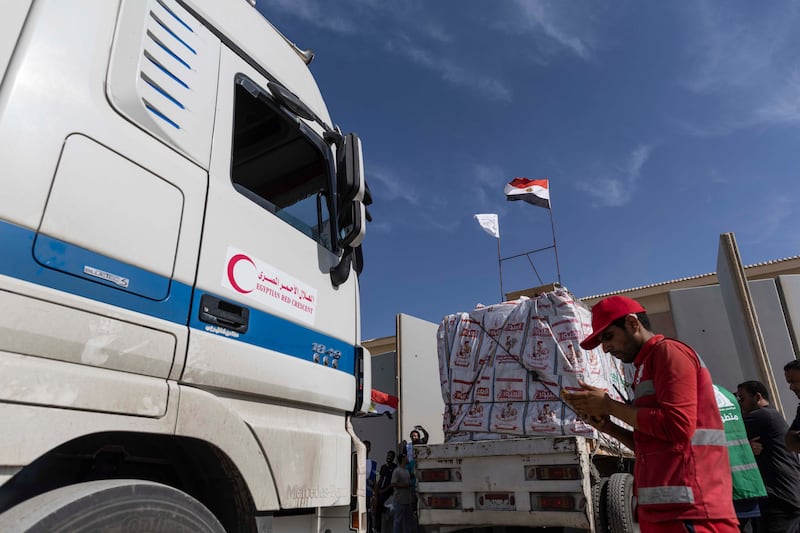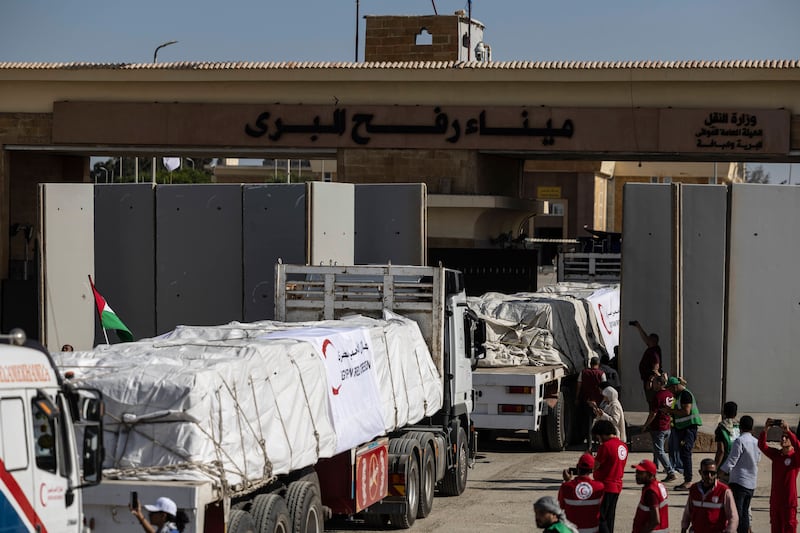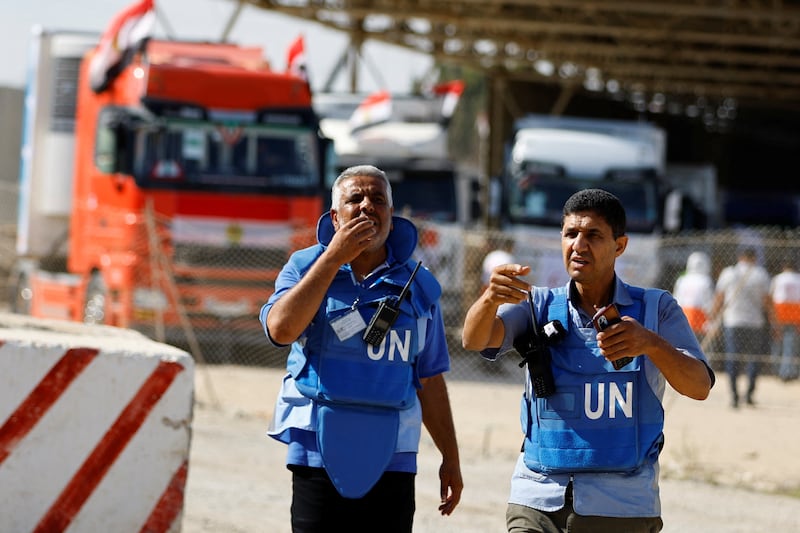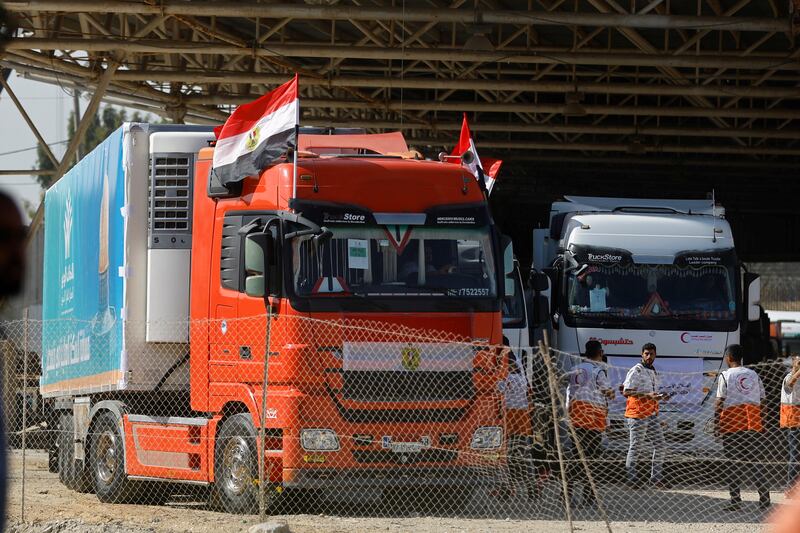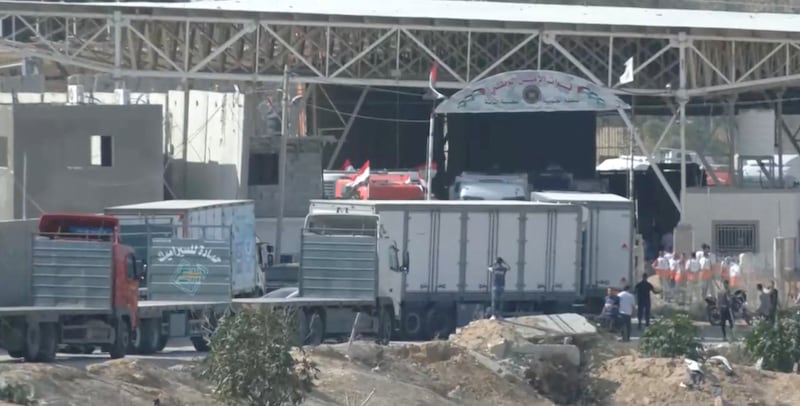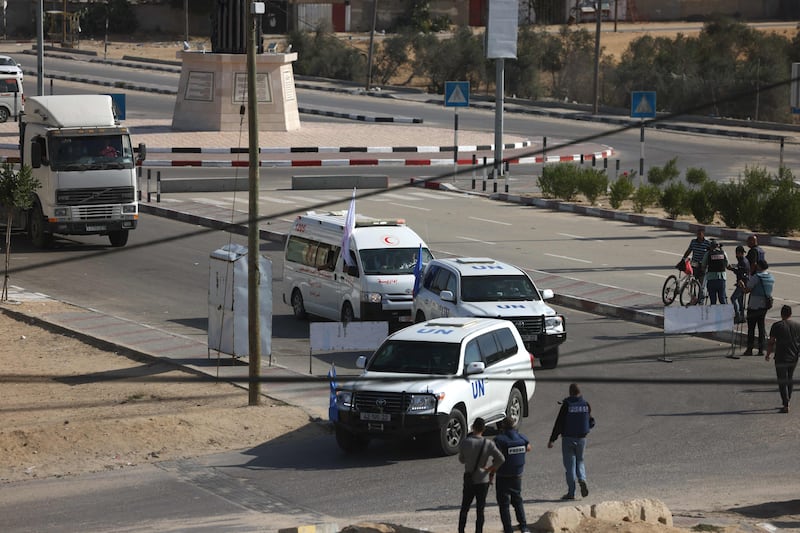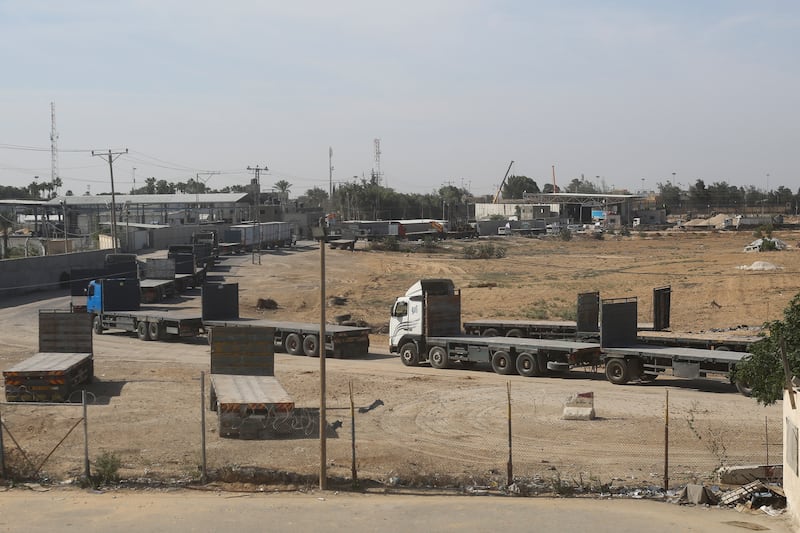Live updates: Follow the latest news on Israel-Gaza
A convoy of 20 aid lorries brought relief to the war-torn Gaza Strip on Saturday but, for humanitarian organisations and many of the residents, it was simply not enough.
Many of Gaza's 2.4 million people rely on aid, but the densely populated has been deprived of fuel, food, water and medical supplies for two weeks, due to Israeli bombardment since the unprecedented Hamas attack on October 7.
The UN said the convoy that finally crossed into Gaza, passing through the Rafah border crossing with Egypt, included life-saving supplies that would be received by the Palestinian Red Crescent.
Fatima Sator, spokeswoman for the International Committee of the Red Cross, welcomed the agreement reached to allow aid into Gaza, but said the convoy “will not be enough to meet the scale of the needs”.
“What is needed is a regular flow of aid into Gaza. Medical staff and other personnel must also be allowed to enter,” she told The National.
The lorries had been waiting for days on the Egyptian side after Israel agreed to allow aid to enter. But the first convoy did not contain any fuel, the shortage of which is threatening to bring Gaza’s healthcare system to a grinding halt.
“Without fuel, there is a risk that hospitals might turn into cemeteries,” Mey Al Sayegh, regional head of communication for the International Federation of Red Cross and Red Crescent Societies, told The National.
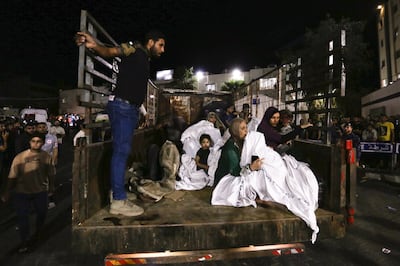
Nebal Farsakh, spokeswoman for the Palestinian Red Crescent, told The National that the organisation along with UNRWA will distribute the first supply of aid to the “most needed areas” in Gaza.
“Hospitals are a top priority as they are facing a critical shortage of essential medical supplies. Food and water are also needed in many areas as people have been struggling without even basic essentials,” she said.
“Some of the medical supplies will be sent to Shifa hospital, which is receiving the greatest number of wounded people. The hospital is already running beyond capacity and is struggling without life-saving medicines,” she added.
The Palestinian Red Crescent confirmed that the lorries would be offloaded at UN warehouses in Dier Balah south of the Gaza Strip.
“Today we signed for and handed over 20 trucks of aid from the Egyptian Red Crescent,” Mahmoud Abu Atta, of the Palestinian Red Crescent, told The National.
“Two of the trucks are for medical [supplies] and medicine and the other 18 are full of relief material and food for needy people.”
Ms Farsakh confirmed that the first convoy of 20 lorries did not contain any fuel, the shortage of which is threatening to bring Gaza’s healthcare system to a grinding halt.
“The biggest challenge hospitals face in Gaza is a shortage of fuel and that has not been allowed in. Without fuel, the entire medical system in Gaza will collapse within hours,” she said.
“Without fuel, nothing can function in Gaza. Hospitals are unable to continue life-saving treatment. Hundreds of patients will have to be taken off life support if electricity stops. And at some point, it will stop.”
NGO officials who spoke to The National from Gaza said the Red Crescent has been pleading for the establishment of a humanitarian corridor so that aid can reach the millions of people in Gaza.
Fatima Sator, spokeswoman for the International Committee of the Red Cross (ICRC), called for an urgent solution to the fuel shortage in Gaza.
“Hospitals can’t run without fuel. Water treatment plants can’t run without fuel,” she told The National.
At least five hospitals in Gaza were completely out of service as of Saturday, while two others are partially dysfunctional, the health ministry of the Hamas-run Palestinian enclave said.
Beit Hanoun Hospital, Durha Peadiatric Hospital, Al Karama Hospital, Al Wafa Rehabilitation Hospital and Patient's Friends Hospital were out of service due to lack of fuel.
Turkish Friendship Cancer Hospital and Mental Health Hospital were partially functioning, said the ministry.
Ms Sator said the ICRC has been able to deliver fuel in small batches to keep healthcare centres and water systems running, but that was not enough.
Although she welcomed the agreement that allowed the first convoy of aid to enter Gaza, Ms Sator backed criticism that it will not be enough to meet “the scale of the needs.”
Four lorries carrying health supplies have started to move towards the Rafah border crossing, on their way to Gaza, the World Health Organisation said on Saturday.
The WHO also said it was working with the Egyptian and Palestine Red Crescent societies to ensure the safe passage of critical supplies.
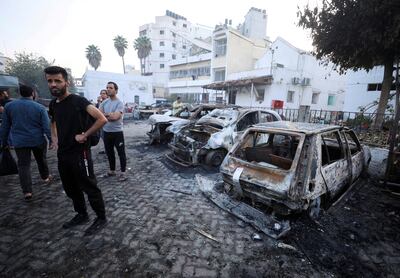
Dr Medhat Abbas, Gaza's health ministry director general, told The National hospitals are falling back on whatever fuel they can source from private parties or fuel stations to continue operations.
“We have sent an urgent distress call to all gas station owners and anyone who has any litre of diesel by immediately communicating with the Ministry of Health via its toll-free number [103] in order to save the lives of the wounded and sick.”
He said doctors had no option but to “pick and choose” patients depending on their chances of survival and conduct life-saving surgeries.
“Surgeons are forced to see which patients can be saved with little effort, they save them, but in difficult cases, they are left to die.”
“Without fuel, there is a risk that hospitals might turn into cemeteries,” Mey Al Sayegh, regional head of communication for the IFRC, told The National.
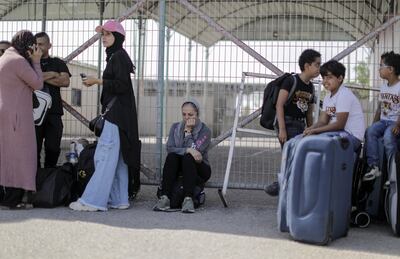
While the 20-lorry convoy entered Gaza through the Rafah crossing on Saturday, hundreds of Gazans, many of whom are dual nationals, are still waiting on the Palestinian side of the border, hoping they will soon be able to cross into Egypt and travel abroad.
Majed Al Nakhala, 67, told The National he has been waiting for days to cross but many, like him, have been growing impatient.
“There is no electricity, water or medicine, my mother is sick and I really want to leave Gaza,” Mr Al Nakhala said.
He arrived in Gaza 19 days before the war began, to visit his family, and now wants to go back to London where his sons and daughters are waiting for him.
“No one wants the war, I don't know if I can leave Gaza, but I hope so,” Mr Al Nakhala added.
